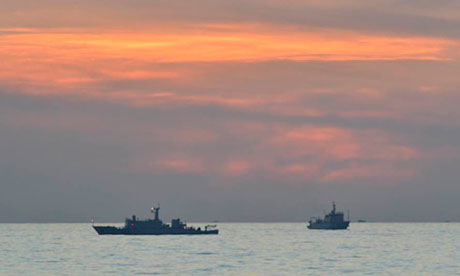(AP) China, Philippine naval standoff continues
By JIM GOMEZ
Associated Press
MANILA, Philippines
A dangerous naval standoff between China and the Philippines at a disputed South China Sea shoal has eased, but tension flared anew after China deployed a second ship and an aircraft that briefly hovered over the area, Filipino officials said Sunday.
The South China Sea, one of the world’s busiest sealanes, has become more vulnerable to confrontations after governments with conflicting territorial claims started beefing up their maritime forces.
A Philippine warship attempted to arrest several Chinese fishermen, who were accused of illegally entering and collecting endangered coral, giant clams and live sharks Tuesday at the disputed Scarborough Shoal off the northwestern Philippines. Two Chinese government ships arrived and prevented any arrests, sparking the standoff.
Chinese officials said their fishermen sought refuge at the shoal, which they said was part of Chinese territory, due to bad weather but they were harassed by the Philippine navy ship.
The Philippine warship later sailed away and was replaced by a Filipino coast guard vessel. All Chinese fishermen later slipped away from the shoal, diffusing the standoff.
But tensions flared anew on Saturday after China deployed a second surveillance ship, along with a Chinese aircraft that briefly flew over the Philippine coast guard vessel at the shoal, Philippine Foreign Secretary Albert del Rosario said.
One of the Chinese ships also ordered a Philippine-registered yacht, which was carrying French nationals involved in an archaeological survey, to leave the Scarborough, which lies about 230 kilometers (143 miles) off the Philippine province of Zambales, Philippine officials said.
Del Rosario, who left for a weeklong trip to the United States on Sunday, said he would continue to oversee negotiations with China to end the impasse.
Carlyle Thayer, a South China Sea expert at the University of New South Wales in Australia, said the Scarborough standoff was the latest reminder of an urgent need for China and other claimant countries to come up with arrangements to ensure disagreements, like fishermen straying into disputed waters, would not become violent, while the territorial disputes remain unresolved.
Such an arrangement, Thayer said, could be included in a proposed “code of conduct” being drafted by the 10-member Association of Southeast Asian Nations, which includes four nations involved in South China Sea conflicts, and China.
China and rival countries like Vietnam and the Philippines have bolstered their maritime forces to protect islands, reefs and potentially oil- and gas-rich offshore areas they claim in the South China Sea, increasing the possibility of confrontations, he said.

COMMENTS
Please let us know if you're having issues with commenting.